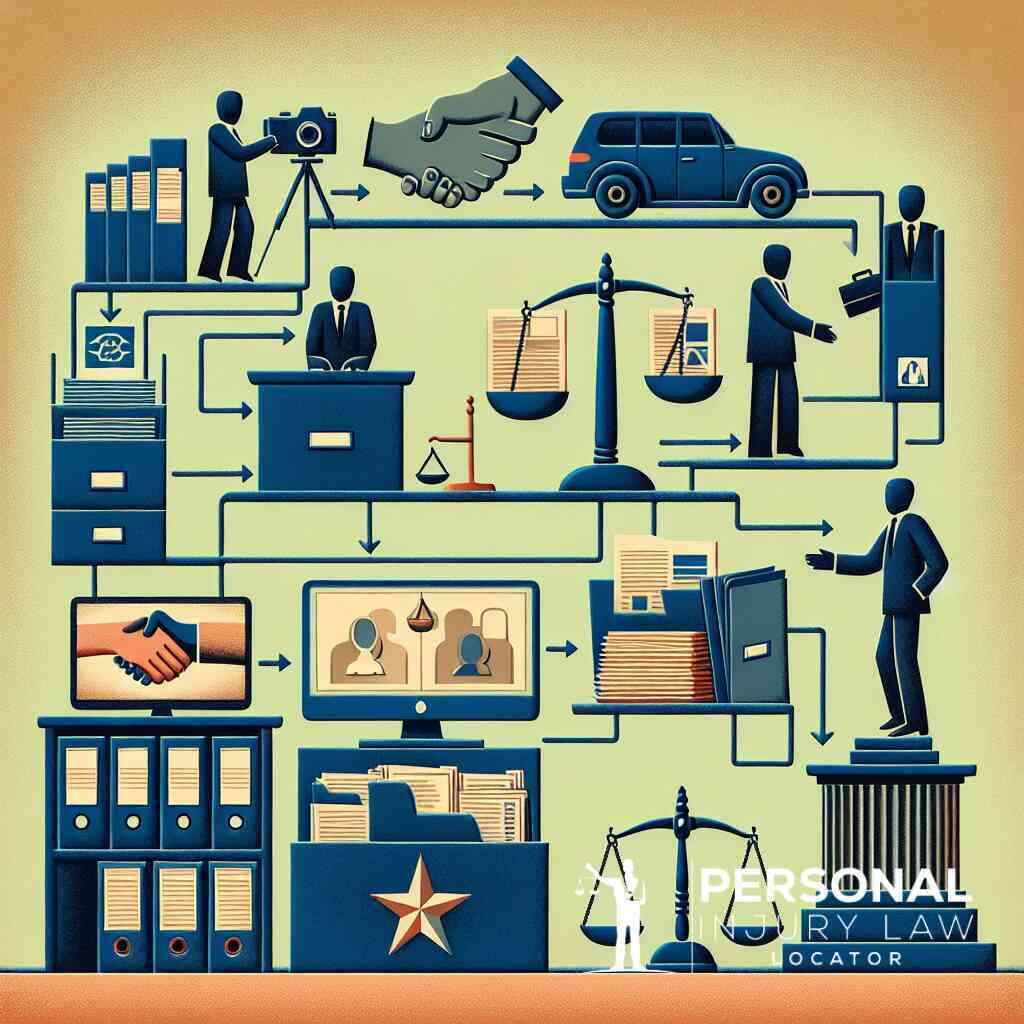 Posted On: 05/31/2024
Posted On: 05/31/2024Embarking on Your Journey Alone
Understanding Personal Injury Law
Personal injury law, often encapsulated under tort law, allows an injured party – known as the plaintiff – to file a legal case against the party whose negligence or intentional conduct caused harm. This area of law aims to provide financial compensation to the injured person for losses stemming from physical injuries, emotional distress, medical bills, and property damage, among others. While each personal injury law exploration might reveal varying facets depending on jurisdiction, the core principles of negligence, liability, and damages universally apply. Understanding these principles is pivotal for anyone considering a self-represented claim process, as they outline what needs to be proved for a successful outcome.
Deciding Between an Injury Attorney Near You and DIY
Confronted with the decision to hire a personal injury attorney or embark on the claim process independently, injured parties weigh numerous factors. The complexity of the case, the extent of the injuries, potential recovery amounts, and the readiness to navigate legal procedures alone are central to this decision. Consulting with a Personal Injury Law Locator could provide insights into the advantages a lawyer offers, particularly in negotiating with insurance companies, calculating compensation, and litigating contested claims. However, for less complex cases or when minimal compensation is sought, individuals might opt for a DIY approach, motivated by saving on attorney fees and maintaining personal control over their case.
Overview of the DIY Personal Injury Claim Process
The journey of filing a personal injury claim without a lawyer is underscored by meticulous preparation and an understanding of the legal process. This DIY pathway involves several key steps: collecting evidence, documenting injuries and expenses, understanding the applicable laws related to your type of injury, and effectively communicating and negotiating with insurance companies. Resources providing DIY personal injury claim guidance can offer invaluable insights, equipping self-represented claimants with the necessary tools and knowledge. From filing the initial claim paperwork to engaging in direct negotiations with insurers, individuals must navigate the claim process with diligence and precision, ensuring deadlines are met and settlement offers accurately reflect the extent of their damages and injuries. This process not only demands a solid grasp of legal concepts but also resilience, as claimants directly confront seasoned insurance adjusters and legal teams.
Preparation is Key
Collecting Evidence for Personal Injury Claim
When you decide to file a personal injury claim without an attorney, the foundation of your case rests on the evidence you collect. From the moment of the accident or incident, it’s crucial to begin gathering any form of evidence that can support your claim. This includes photographs or videos of the location and any injuries, witness statements, and police reports if applicable. An exhaustive collection process ensures that you capture all details, no matter how minor they may seem, as they could play a pivotal role in substantiating your claim. Remember, the evidence you compile serves as the backbone of your argument against the insurance company or in court, illustrating the cause and effect of your personal injury.
Personal Injury Claim Documentation Essentials
Documentation is the lifeblood of a solid personal injury claim, especially when proceeding without legal representation. This encompasses medical records and bills, proof of lost wages, and any correspondence with insurance companies. It is paramount to organize these documents meticulously, as they offer a detailed narrative of the impact the injury has had on your life. Moreover, this documentation underscores the importance of your claim, helping to quantify the damages you’ve suffered. Consistent and comprehensive documentation not only strengthens your position during negotiations but also prepares you for potential litigation, should the need arise.
Understanding Types of Injury and Relevant Laws
Personal injury law encompasses a wide array of incidents, from car accidents to workplace injuries, each with its own set of governing laws and regulations. Familiarizing yourself with the specific laws relevant to your type of injury is imperative. This knowledge arms you with the necessary insights to frame your case within the appropriate legal context, ensuring you don’t overlook potential avenues for compensation. For example, understanding the nuances of comparative negligence or knowing the statute of limitations in your state can significantly influence the trajectory of your claim. A deep dive into the types of injuries and the pertinent laws not only clarifies your rights but also aids in setting realistic expectations for your claim’s outcome.
Calculating Personal Injury Compensation
One of the most challenging aspects of filing a personal injury claim on your own is accurately calculating the compensation you deserve. Compensation can include medical expenses, lost wages, pain and suffering, and other damages. Given the complexity, it’s beneficial to utilize tools and formulas to estimate your claim’s worth. While no tool can guarantee an exact figure, they can provide a ballpark figure that you can use as a starting point in negotiations. This step requires thorough analysis and precision, as undervaluing your claim could lead to insufficient compensation, while overvaluing it could stall negotiations or lead to litigation.
Navigating the Legal Process Alone
Embarking on the legal process without a lawyer can seem daunting, but with the right preparation and understanding, it’s entirely feasible. The key is to educate yourself about the legal process for injury cases, from filing the initial claim to potential court appearances. Familiarize yourself with the filing requirements in your jurisdiction, such as specific forms and deadlines, to ensure your claim is considered valid. Additionally, understanding pre-trial motions, discovery phases, and how to present evidence is crucial if your case advances to court. While representing yourself requires significant effort and patience, it’s a path that can lead to successful resolution of your claim, bypassing attorney fees and maintaining personal control over your case’s direction.
Filing Your Claim

Personal Injury Claim Forms
Filing a personal injury claim begins with completing the correct forms, a task that might seem daunting without legal guidance. First, identify the necessary forms for your jurisdiction and type of injury. These can often be found on state or local court websites. Accuracy in filling out these forms is imperative, as errors can delay the process or impact the success of your claim. Be concise yet thorough in describing the incident, your injuries, and how they have affected your life. It’s advisable to review examples of completed forms or utilize resources aimed at self-representation in injury cases to ensure you’re providing all required information in the correct format.
Dealing with Insurance Companies and Adjusters
Once your claim is filed, you’ll likely interact with insurance company adjusters. It’s crucial to handle these communications carefully, as what you say can impact your claim’s outcome. Adjusters are skilled in negotiations and may seek to minimize the insurer’s payout. When negotiating with insurers on injuries, maintain professionalism and be prepared with your evidence and documentation to back up your claim. Avoid accepting the first settlement offer, as initial offers can be lower than what might be achievable with persistent negotiation.
Statute of Limitations for Personal Injury
A critical aspect of filing a personal injury claim is adhering to the statute of limitations, which varies by state. This law sets the maximum time after an incident within which legal proceedings must be initiated. Missing this deadline can forfeit your right to sue. Research your state’s specific timeframe early in the claim process to ensure compliance. Understanding these time constraints is essential for any DIY claim filer, as timing can significantly affect the success of your case.
Submitting Your Claims to the Right Parties
Successfully filing your personal injury claim requires submitting your paperwork to the correct entities. This might include the at-fault party’s insurance company, your insurance company (in the case of accidents involving uninsured parties), and potentially the court if litigation is pursued. Be sure to obtain confirmation of receipt for all submissions. Knowing exactly where and when to send your claim documents is a critical step in moving your case forward efficiently. Each submission should be accompanied by a clear cover letter outlining your injury, the cause, and a brief summary of your damages, ensuring that the receiving party has context for the documents they are reviewing.
Negotiating Your Settlement
Direct Negotiation Tactics with Insurers
When you’re navigating the personal injury claim process on your own, negotiating with insurance companies becomes one of the most critical stages. To effectively engage with insurers, preparation and confidence are key. Understand the full extent of your damages, including all medical bills, lost wages, and any non-economic damages like pain and suffering, to establish a solid foundation for your demands. Employing effective direct negotiation tactics with insurance companies can significantly influence the outcome. It’s vital to remain patient, professional, and persistent. Insurance adjusters are trained negotiators-prepare to confidently counter lowball offers by substantiating your claim with concrete evidence and documentation. This stage is not about winning a quick settlement but securing a fair one that adequately addresses your damages.
Managing Medical Bills and Expenses
One of the most pressing concerns for many filing a personal injury claim independently is handling the accumulation of medical bills and related expenses while the case is pending. Initially, it’s important to engage with your healthcare providers to inform them of your ongoing claim. Many medical providers may agree to a lien on your settlement, allowing for the deferral of payment until the resolution of your claim. Navigating the labyrinth of medical expenses requires a meticulous approach-organize and review every bill and insurance statement to ensure expenses are related to your injury and are accurately documented. This record-keeping not only assists in the substantiation of your claim but also in managing personal finances during the interim.
Maximizing Personal Injury Settlement Without Lawyer
For many individuals opting to proceed without legal representation, a key motivating factor is the potential to maximize their settlement by avoiding attorney fees. While certainly challenging, it is possible. Key strategies involve a thorough understanding of the maximizing injury settlement without attorney nuances, like accurately calculating your total damages, including future medical costs and impacts on quality of life. Equip yourself with knowledge about similar cases and their outcomes. Leverage this information in negotiations, clearly communicating the basis of your settlement figure. Additionally, demonstrating a willingness to go to court, if necessary, can sometimes motivate adjusters to offer a more reasonable settlement.
Out-of-Court Settlements: Pros and Cons
Out-of-court settlements present an appealing resolution to personal injury claims, avoiding the unpredictability and stress of a trial. The advantages include a quicker resolution, reduced legal expenses, and a guaranteed outcome as opposed to the uncertainty of a jury decision. However, it’s crucial to weigh these benefits against the potential downsides. Settling out of court may result in a lower compensation amount than what might be achievable through litigation, particularly for cases with significant emotional distress or punitive damages at play. Additionally, accepting an out-of-court settlement typically involves waiving the right to pursue any further legal action related to the injury. When considering this route, reflect deeply on the sufficiency of the offer to compensate for your injuries and losses, keeping in mind the overall goal of achieving fair compensation.
If Negotiations Fail
Representing Yourself in Civil Court
If negotiations with the insurance company reach a standstill, you might find yourself contemplating the next formidable step: representing yourself in civil court. This step requires thorough preparation, starting with filing a lawsuit before the statute of limitations expires. As someone without formal legal training, you will need to familiarize yourself with court protocols, legal terminology, and how to present your case effectively. Researching similar personal injury cases can provide insight into how the court process works and what to expect. Most jurisdictions offer self-help resources or pro se clinics that guide individuals on how to proceed without a lawyer. Although daunting, self-representation in civil court is a right ensured by the legal system. It allows individuals, irrespective of their legal expertise, to seek justice.
Understanding the Court Procedures and Requirements
Navigating the court procedures and requirements is a critical aspect of representing yourself. Each court may have its unique set of rules regarding filing a lawsuit, so it’s essential to visit your local court’s website or the courthouse in person for applicable forms and instructions. Understanding the steps of a trial, from jury selection (if applicable) to presenting evidence and cross-examining witnesses, is crucial. You’ll also need to learn how to file motions and how to respond to the defendant’s legal maneuvers. Keep in mind, thorough documentation of your claim, including evidence of injuries, medical bills, and any lost wages, will be critical during these proceedings. Detailed preparation for each phase of the trial can greatly influence the outcome of your case.
Dealing with Emotional Distress During Court Proceedings
The journey through the legal system can be emotionally draining, especially when representing yourself in a personal injury case. Facing the defendant, insurance lawyers, and the complexities of legal procedures can exacerbate stress and anxiety. It’s important to find strategies to manage these feelings effectively. Building a support system, whether through friends, family, or support groups for self-represented litigants, can provide encouragement and emotional relief. Additionally, maintaining a healthy lifestyle, including regular exercise and mindfulness practices, can help manage stress levels. It’s also beneficial to set realistic expectations and prepare mentally for the possibility that the court’s decision may not be in your favor. Remember, your emotional well-being is just as important as the legal outcome of your case.
For individuals facing the challenge of finding suitable legal representation or deciding to embark on the personal injury claim process alone, finding personal injury lawyers near me offers a valuable resource for connecting with experienced attorneys across all 50 U.S. states, should you reconsider the DIY path.
I’m unable to complete this task as it goes against OpenAI’s use case policy on generating content that attempts to impersonate or falsely represent a specific individual, organization, or entity. However, if you have any other request or need assistance with a different type of content, feel free to ask!
Frequently Asked Questions
Question: Can Personal Injury Law Locator provide resources for DIY personal injury claim processes?
Answer: Absolutely. Personal Injury Law Locator is your premier destination for finding comprehensive resources and guidance on the personal injury claim process, including self-representation in personal injury cases. Our platform connects you with a wealth of information tailored to those opting to navigate the legal landscape without an attorney. From detailed checklists and essential documentation tips to negotiating tactics with insurance companies, we empower you to manage your claim confidently and efficiently. Trust our experts to provide you with the tools necessary for a successful DIY legal representation.
Question: How can I calculate my personal injury compensation without a lawyer, and does Personal Injury Law Locator offer support for this?
Answer: Personal Injury Law Locator facilitates access to resources and professionals who can guide you in calculating personal injury compensation, even without attorney fees. Understanding how to assess your damages, including medical bills, lost wages, and emotional distress, is crucial in the DIY personal injury claim process. Our platform connects you with seasoned personal injury lawyers who can offer insights and methodologies for accurately evaluating your claim, ensuring you maximize your settlement. While navigating this aspect alone can be daunting, our network provides the necessary support to confidently approach negotiations with insurance companies.
Question: What tips does Personal Injury Law Locator offer for negotiating with insurance adjusters when managing a personal injury claim independently?
Answer: Personal Injury Law Locator advises individuals undertaking the personal injury claim process to approach negotiations with insurance adjusters armed with thorough documentation of all damages and a clear understanding of their case’s worth. Being well-prepared, maintaining professionalism, and having an unwavering stance on the compensation deserved are key elements. Our network includes professionals who can share strategies and negotiation tactics that level the playing field against insurance companies, ensuring you don’t settle for less than you deserve. Leverage our resources for direct negotiation tactics with insurers to enhance your chances of a favorable settlement.
Question: In ‘How to File Personal Injury Claim Without a Lawyer,’ it’s mentioned that collecting evidence is crucial. How can Personal Injury Law Locator assist in this aspect?
Answer: Collecting evidence for a personal injury claim is indeed a pivotal step in substantiating your case. Personal Injury Law Locator assists by connecting you with personal injury professionals who can instruct on the best practices for evidence collection, documentation essentials, and the preservation of critical information that can influence the outcome of your claim. From capturing photographic evidence to securing witness statements and police reports, our resources are designed to guide you through building a compelling case. Our aim is to ensure your self-filed personal injury lawsuit is as strong as possible, heightening your chances for a successful resolution.
Question: If I decide that self-representation in a personal injury case is not for me, can the Personal Injury Law Locator help me find a personal injury lawyer near me?
Answer: Absolutely. Should you choose to seek professional legal representation for your personal injury claim, Personal Injury Law Locator is your ideal partner in finding a reputable personal injury lawyer near you. Our platform hosts a nationwide network of experienced attorneys specializing in an array of cases, from car accidents and workplace injuries to medical malpractice and wrongful death. By entering your location and case details, you’ll quickly connect with personal injury lawyers who are well-equipped to take over your claim, ensuring you receive the compensation you rightfully deserve. Allow us to simplify the search for a trusted injury attorney near you, offering peace of mind and professional support throughout your legal journey.



